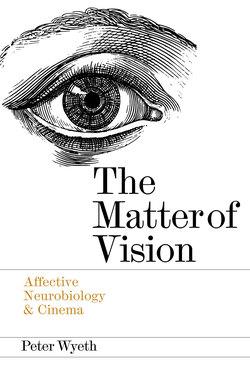Читать книгу The Matter of Vision - Peter Wyeth - Страница 19
На сайте Литреса книга снята с продажи.
New Empiricism
ОглавлениеThere is a clear line to be drawn here between what is regarded as a proper materialism, in which ideas have to be capable of submission to experimental testing, and the rhetoric of Film Theory and its intellectual parents. The latter often apes the garb of materialism, but in reality it is the King’s New Clothes, nothing remotely to do with the essential discipline of science.
The call here is for a return to the fundamentals of real materialism, with the principle of testability as the gold standard. This is not however, it should be said, a return to the traditional logic of scientific method and empiricism of old, but one whose potential I would suggest has been radically changed by the inclusion of Emotion43 within the walls of what might be thought of as a New Scientific Method. That change would seem to me to have the potential to be a revolution In submitting the formerly excluded area of what had been thought of as subjective, the opposite of and enemy to Reason – the foundation of science – to scientific analysis and methods, it has been shown that areas such as Consciousness, Dreams and Emotion are capable of objective analysis. This might be called a New Empiricism, a change that I would argue qualitatively extends the reach of scientific method, with profound implications.
There are certain parallels with the difference in perspective identified by the large body of research on ‘hemispherical lateralisation’ between the two hemispheres (the left brain/right brain debate). Current opinion is that both sides of the brain deal with the full range of problem-solving, but the left side brings a narrow, focussed and goal-oriented approach, whereas the right side brings a broader, more holistic and innovative approach. The inclusion of Emotion within the citadel of scientific method is as though science has been able in some way to embrace the complementary biological value of a ‘right-side’ approach, in an appreciation of the value of elaboration of a fuller picture than had been possible hitherto when focussing strictly on a ‘left-side’ rationality. The scepticism that remains among many scientists to consideration of Emotion indicates that would be over optimistic, if arguably worthwhile as an aim. There remains significant resistance to the inclusion of Emotion and other subjectivisms within the ranks of scientists, so it would be misleading to represent what is effectively a shift in epistemology as universally accepted. Even researchers in the area are reluctant to make too much of the development, perhaps partly because of the barely-concealed scepticism emanating from their more conservative colleagues. However, this project does not hesitate to come out unequivocally in favour of the development, and to the extent of hailing it as a revolution in scientific method.
